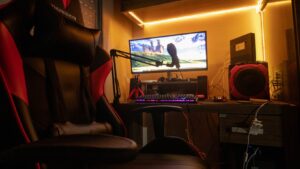Gaming PC Guide for Beginners
Gaming PC Guide for Beginners provide enhanced graphics, faster processing, and improved performance for video games. They consist of several essential components that determine their efficiency and suitability for gaming. A gaming PC’s primary role is delivering smooth gameplay by meeting or exceeding game requirements. It handles high-resolution graphics, complex physics, and quick data processing, ensuring immersive experiences.
Key Components:
- Graphics Card (GPU): A vital part of a Gaming PC Guide for Beginners, GPUs render visuals, enabling high frame rates and detailed imagery. Popular models include NVIDIA GeForce RTX and AMD Radeon RX.

- Processor (CPU): The CPU processes game logic and instructions. It’s crucial for multitasking and running demanding games. Intel Core i7 and AMD Ryzen 7 are common choices.
- RAM: Random Access Memory (RAM) affects the system’s ability to handle multiple tasks simultaneously. 16GB is typically sufficient for most games.
- Storage: Solid State Drives (SSD) offer faster load times compared to Hard Disk Drives (HDD), significantly improving game performance.
- Power Supply Unit (PSU): A reliable PSU provides power to all components, ensuring stability during intensive sessions. Adequate wattage is important.
Pre-built systems offer convenience and optimized configurations. Custom-building allows for tailored components and potential cost savings, beneficial if one understands hardware compatibility.
Essential Components for a Gaming PC
Choosing the right components for a Gaming PC Guide for Beginners enhances user experience and performance. Identifying the essential parts helps newcomers make informed decisions. A Gaming PC Guide for Beginners relies on a powerful CPU for multitasking and game performance. Key attributes include clock speed, core count, and cache size. Beginners benefit from considering at least a quad-core CPU with modern architectures like Intel’s i5 series or AMD’s Ryzen 5 series. These models handle demanding games and software with ease.
The choice of GPU directly influences gaming visuals and frame rates. Essential factors include VRAM size, clock speed, and compatible resolutions. Graphics cards like NVIDIA’s GeForce GTX 1660 or AMD’s Radeon RX 5600 XT provide solid performance for most games. A suitable GPU ensures smooth gameplay in various settings.
RAM affects a system’s ability to manage multiple processes smoothly. Optimal choices balance capacity and speed, with a minimum of 16GB DDR4 recommended for Gaming PC Guide for Beginners. This configuration ensures efficient handling of games and background applications without lag.
Storage type impacts game load and boot times in gaming PCs. SSDs offer rapid data access, reducing latency compared to traditional HDDs. For improved performance, combining a 500GB SSD with a larger HDD for additional storage achieves a balance between speed and space.
Building vs Buying a Gaming PC
Choosing between building or buying a gaming PC is crucial for beginners seeking the best gaming experience. Each approach has its advantages and disadvantages, impacting cost, customization, and convenience. Building a gaming PC offers customization and personal satisfaction. Users select every component, ensuring performance aligns with specific gaming needs. Upgrading later becomes easier since users understand the system’s architecture.
- Pros:
- Customization: Users match components like the CPU and GPU to their gaming preferences.
- Performance: Ensures optimal performance by choosing compatible and top-performing parts.
- Learning Experience: Enhances technical skills by understanding computer assembly and component interaction.
- Cons:
- Time-Consuming: Gathering parts and assembling them requires significant time.
- Initial Cost: Upfront costs may be higher when buying individual components separately.
- Complex Assembly: Beginners may struggle with the complexity of building and troubleshooting potential issues.

Buying a pre-built gaming PC saves time and effort. It is ideal for those who prioritize convenience and guarantees that the system is ready to use immediately.
- Pros:
- Convenience: No assembly is required; it arrives ready to use, making it accessible for newcomers.
- Warranty and Support: Often includes manufacturer support and warranties for ease of mind.
- Quick Availability: Perfect for those seeking immediate access to gaming without delays.
- Cons:
- Limited Customization: Options for personalization and component selection are restricted.
- Potentially Higher Cost: Premiums are charged for assembly and convenient services.
- Upgrading Difficulty: Pre-built systems may have limited upgrade paths due to proprietary designs.
A beginner’s decision between building or buying depends on priorities such as customization, time commitment, and initial budget. Navigating the world of Gaming PC Guide for Beginners can be daunting for beginners, but it’s a rewarding journey that enhances the gaming experience significantly. Understanding the core components and their roles is crucial in making informed decisions. Whether one opts to build a custom system or purchase a pre-built setup, the key is aligning choices with personal preferences and budget constraints. By prioritizing essential components and considering future upgrades, beginners can craft a gaming PC that delivers exceptional performance and enjoyment. With the right setup and peripherals, any gamer can immerse themselves in the thrilling world of gaming with confidence and excitement.

